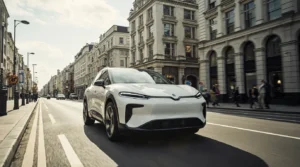BYD in the UK: How the Chinese EV Giant is Redefining Britain’s Electric Mobility

BYD in the UK is reshaping the electric vehicle landscape with a strategic expansion that challenges established European automakers and directly rivals Tesla’s market influence. As Britain accelerates toward a zero-emission future, BYD has emerged as a powerful symbol of innovation, affordability, and disruption in the EV sector
BYD in the UK continues its impressive momentum, turning the once-quiet buzz around Chinese electric vehicles into a full-blown revolution on British roads. Combining aggressive pricing, high-tech engineering, and sustainability-focused strategy, BYD is now on track to become one of the UK’s leading EV brands by 2026.
CDC COVID Vaccines 2025: Navigating a New Era of Pandemic Strategy
table of contents
BYD in the UK: A Strategic Market Expansion
When BYD officially entered the UK market in 2023, few predicted how rapidly it would ascend. Two years later, the company has outpaced early forecasts, with its vehicles now among the top-selling electric models across multiple British regions.

BYD in the UK
Recent data show that BYD’s Atto 3 has become one of the UK’s best-selling mid-range electric SUVs — a feat achieved through a combination of intelligent marketing, competitive pricing, and expanding dealership networks. The company’s decision to partner with established British distributors has significantly boosted consumer trust in what was once viewed as an “imported experiment.”
More importantly, BYD’s growth coincides with a transitional moment in Britain’s automotive market. As traditional giants like Nissan, Ford, and BMW recalibrate their EV strategies, BYD is exploiting the gap between innovation and affordability — a space British consumers have been eagerly waiting for.
Technology and Design: The Core of BYD’s Success
One of BYD’s strongest competitive edges lies in its in-house battery technology. Unlike most automakers, BYD designs and manufactures its own batteries — the Blade Battery — which offers improved safety, longer lifespan, and lower cost per unit.
The Blade Battery has become a global benchmark for EV durability and sustainability. Its lithium iron phosphate (LFP) composition not only reduces fire risk but also supports faster charging cycles — a crucial factor for urban British drivers navigating London’s dense traffic and limited charging infrastructure.
In addition, BYD’s commitment to software-defined vehicles has positioned it as a future-oriented brand. The company’s proprietary “DiPilot” intelligent driving system and AI-enhanced energy management represent BYD’s effort to merge smart mobility with environmental responsibility.
How BYD Captured the British Consumer’s Imagination
The success of BYD in the UK goes beyond numbers — it’s cultural. British consumers have long been skeptical of imported car brands, particularly from China. Yet, BYD’s approach to marketing has been quietly brilliant: rather than emphasizing its Chinese origin, it focuses on universal values — safety, sustainability, and innovation.
The launch campaign for the Atto 3 and Dolphin EVs in the UK featured British landscapes, family road trips, and relatable daily-life narratives — not distant futuristic imagery. This localized storytelling made BYD’s brand feel personal and grounded in the British lifestyle.
Moreover, the brand’s presence at major automotive events such as the Goodwood Festival of Speed helped it gain legitimacy among car enthusiasts who value performance and design excellence. Today, BYD’s vehicles are no longer seen as budget alternatives — but as credible EV choices that blend quality and innovation.
Partnerships, Infrastructure, and the European Connection
BYD’s UK strategy is deeply intertwined with its broader European expansion. With the company doubling its dealership network across the continent and investing in new production facilities, Britain has become a key node in BYD’s Western operations.
The upcoming Hungarian gigafactory, for example, is expected to serve as a supply base for the UK market, reducing logistical costs and mitigating the impact of post-Brexit tariffs. This move will allow BYD to keep its UK prices stable even as global shipping and material costs fluctuate.
On the infrastructure side, BYD is collaborating with Octopus Electric Vehicles and other UK-based energy firms to create integrated ecosystems — from home charging solutions to fleet electrification programs. This partnership-oriented approach reflects BYD’s belief that the EV revolution requires collective collaboration, not isolated innovation.
A Sustainable Vision Beyond Cars
Unlike many competitors, BYD’s ambition extends far beyond car sales. Its brand name — “Build Your Dreams” — is now becoming a philosophy embedded in renewable ecosystems.
The company has introduced BYD Energy UK, a division focused on solar panels, battery storage, and smart energy solutions for homes and businesses. This positions BYD not just as a car manufacturer but as a holistic clean energy provider — perfectly aligned with Britain’s long-term decarbonization goals.
In urban centers like Manchester and Birmingham, pilot projects are already underway where BYD electric buses and municipal fleet vehicles are being tested for full-scale transition programs. If successful, these could mark the beginning of a nationwide electrification wave spearheaded by BYD’s integrated model.
Challenges and Public Perception
Despite its success, BYD in the UK faces several challenges.
First, the perception barrier remains — some consumers still associate “Chinese cars” with lower reliability, despite mounting evidence to the contrary.
Second, political and trade tensions between China and Western economies could create barriers, such as potential tariffs or regulations that impact competitiveness.
Lastly, the crowded EV market in the UK — dominated by Tesla, Kia, Volkswagen, and emerging European startups — means BYD must constantly innovate to maintain attention. However, the company’s rapid adaptation and continuous model updates suggest it’s well prepared for the fight.
Future Outlook: A British-Chinese Success Story in the Making
BYD’s trajectory in the UK signals more than just commercial success — it marks a cultural and industrial shift in how Britain perceives global innovation.
Within just a few years, the brand has evolved from a newcomer to a credible pillar of the UK’s clean transport movement.
Looking forward, analysts expect BYD to introduce at least four new electric models tailored for the British market by 2026, including the highly anticipated Sealion 7 Performance Edition. If BYD continues combining technology leadership with accessible pricing, it could soon overtake Tesla in UK EV sales — a milestone that seemed impossible only a few years ago.
FAQ: BYD in the UK
Q1: What makes BYD cars popular in the UK?
Their combination of advanced battery technology, affordability, and design tailored to British driving conditions makes them an attractive choice for both families and urban drivers.
Q2: Are BYD cars reliable?
Yes. BYD vehicles undergo European safety testing and feature the Blade Battery, known for exceptional durability and safety under extreme conditions.
Q3: Where can I buy a BYD car in the UK?
BYD has expanded to over 50 dealership locations across England, Scotland, and Wales, with plans to double that network by 2026.
Q4: Is BYD competing directly with Tesla in Britain?
Absolutely. BYD’s Atto 3 and Seal models are seen as direct competitors to Tesla’s Model Y and Model 3 — offering similar performance at lower prices.
Q5: What’s next for BYD in the UK?
Expect expansion into the luxury EV segment and deeper integration into Britain’s clean energy infrastructure — including buses, fleets, and energy storage systems.
Discover more from Feenanoor
Subscribe to get the latest posts sent to your email.











